Celebrating 55 Years: Looking Back at the History of the Collaboration for Justice
On June 12th, 2025, Chicago Appleseed Center for Fair Courts and the Chicago Council of Lawyers will be hosting our annual summer social—this year celebrating the 55th anniversary of the Fund for Justice. As we gear up for that anniversary party, we’re looking back and the almost six decades of collaboration between our two organizations.
The Fund for Justice was established in 1970 by the Chicago Council of Lawyers – Chicago’s first public interest bar association – to act as an independent think tank designed to research the issues important to the Council’s mission. The principal catalyst for the founding of the Chicago Council of Lawyers (“Council”) in 1969 was the state-sanctioned violence at that year’s Democratic National Convention in Chicago, but the purpose of the Council was to focus on “issues directly involving the legal profession—the screening and selection of judges, legal ethics, criminal justice, and legal services for the poor.”
With the creation of the Fund for Justice, the Council was able to push that mission forward, and much of the research and advocacy done by the Council and the Fund for Justice after 1970 were joint endeavors.
- 1970—We successfully petitioned the court to appoint a special prosecutor to investigate the killings of Black Panther leaders Fred Hampton and Mark Clark by Chicago Police Department officers.
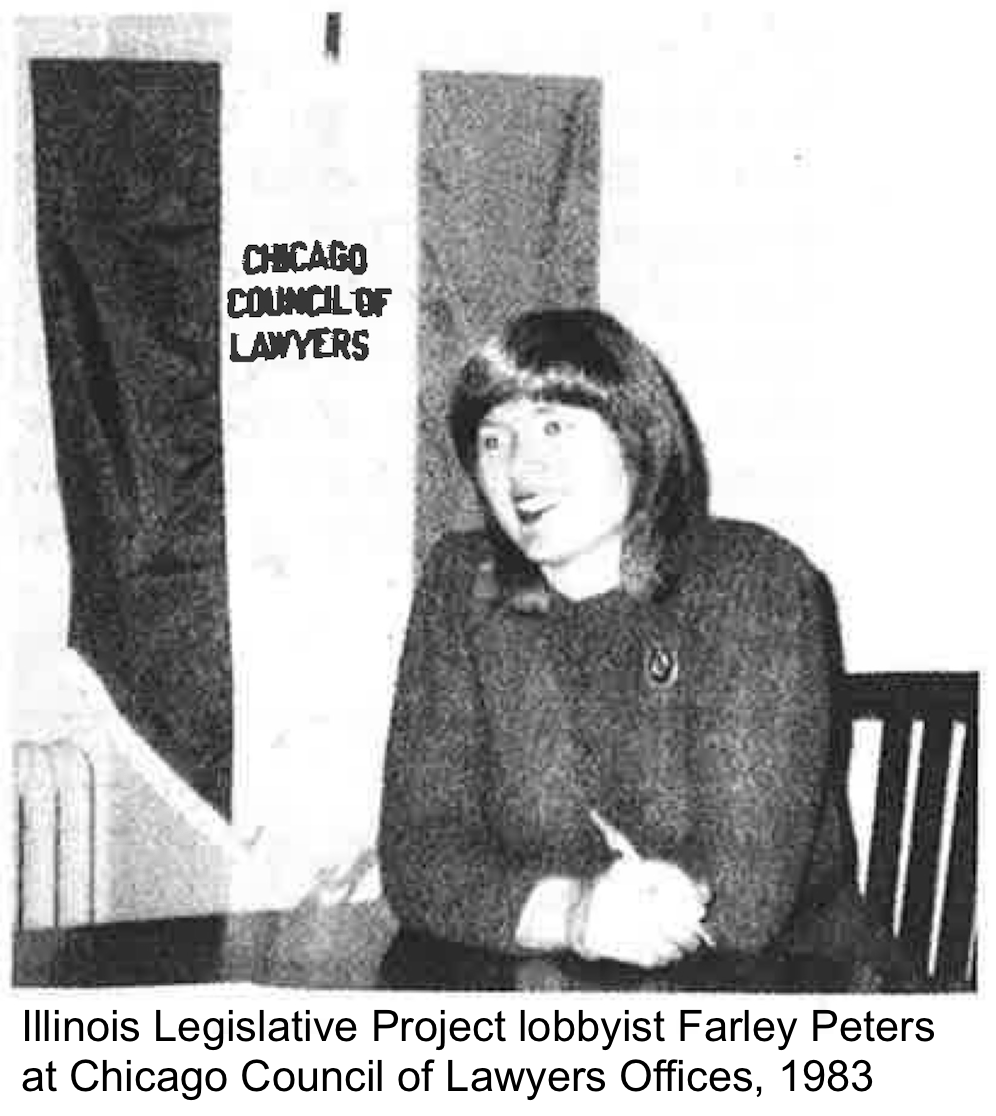
- 1971—We advocated for a Consumers’ Bill of Rights to “attempt to equalize inequalities and imbalances that…exist between buyers and sellers.”
- 1973—We authored a report as a coalition member of the Chicago Law Enforcement Study Group which found that the Chicago Police Department was “‘a trigger happy’ society that too often used excessive force against suspects,” and that the Chicago Police Board “ha[d] failed to control the police department effectively because the board’s ‘dereliction of statutory duties’ that offers it power over the department.” As a result of the report, we were at the forefront of a proposed civilian oversight body of the Chicago Police Department and established Chicago’s first lawyer referral service for victims of police misconduct.
- 1974—We successfully challenged restrictions imposed by a Federal District Court on public comment by attorneys in Chicago Council of Lawyers v. Bauer – a major victory for free speech.
- 1976—We conducted the first survey of almost 900 Chicago lawyers about their views of Federal District Court Judges as a means to increase transparency and accountability on the federal bench, which appoints judges for life.

- 1977—We pioneered the city’s first legal aid clinic, South Shore Law Office, which offered legal services to low- and middle-income people and was ultimately taken over by a private law firm.
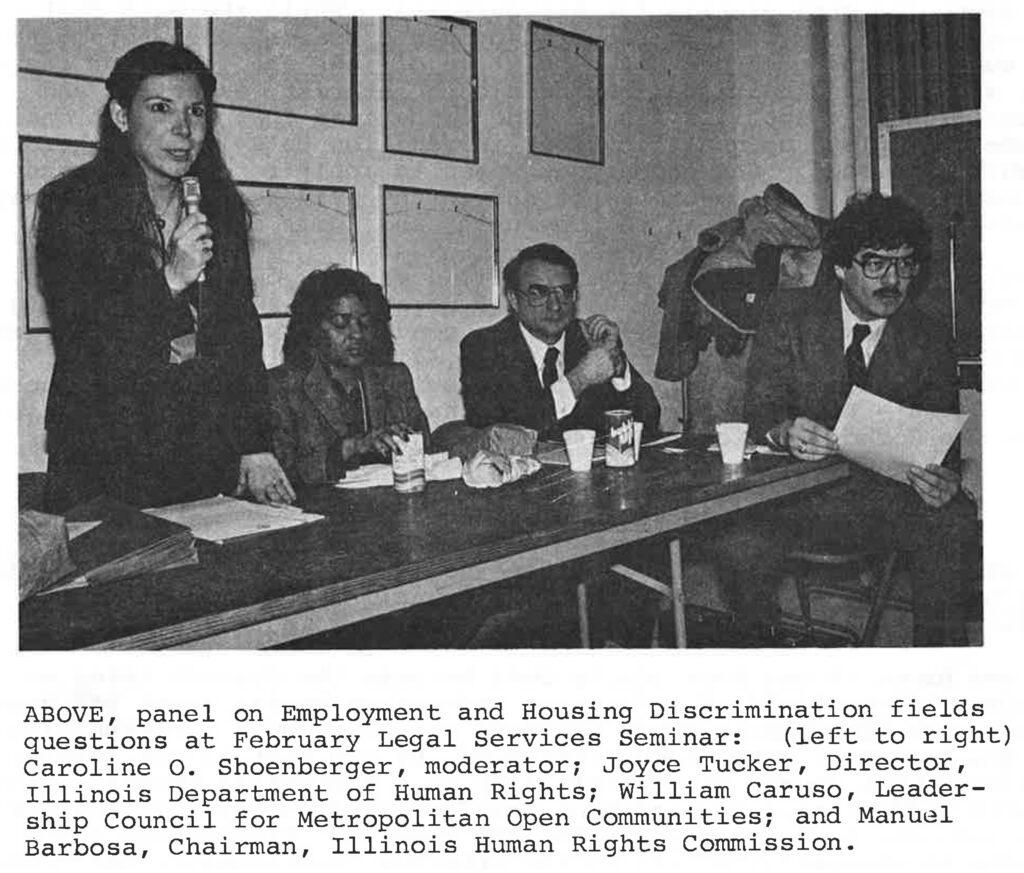
- 1984—We released a “Study of the Chicago Department of Law” (and a follow-up ten years later) which found that the Department was essentially “a loosely knit group of attorneys seeking to prevent legal disasters. They were often unsuccessful.” Under the Harold Washington administration, the City of Chicago implemented the majority of our recommendations.
- 1990—We published the “Tenant-Landlord Handbook” (one of the most stolen books from the Chicago Public Library system) with the Legal Assistance Foundation, now known as Legal Aid Chicago, to help tenants in disputes with landlords and provide resources to protect their rights.
- 1995—We issued “A Study of the Illinois Attorney General’s Office,” which was utilized by the Attorney General to implement major reforms in the office.
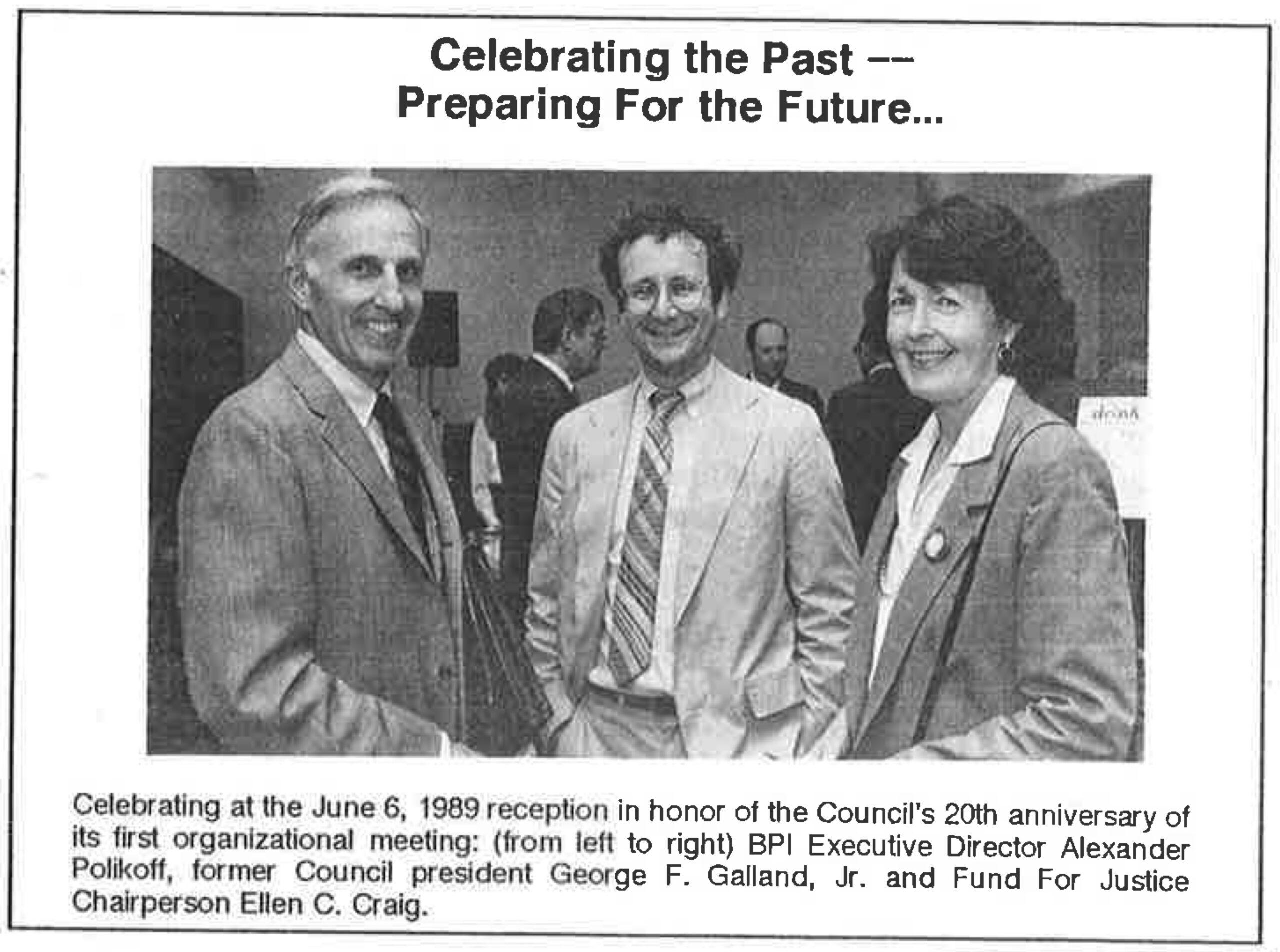
In 1997, the Fund for Justice became the Chicago-based affiliate of the National Appleseed Network, thereby becoming Chicago Appleseed (Center for Fair Courts). In addition to Chicago Appleseed, the Appleseed Network includes 17 other centers across North America: Alabama, Arkansas, Washington, DC, Georgia, Hawai’i, Kansas, Louisiana, Massachusetts, Mexico, Missouri, Nebraska, New Jersey, New Mexico, New York, Oklahoma, South Carolina, and Texas. Each center is an autonomous organization but the Appleseed Network provides connections between these centers to build systemic solutions for injustices.
Since 1997, Chicago Appleseed and the Chicago Council of Lawyers have worked in partnership with each other – as the Collaboration for Justice – to fight for court transparency, accountability, and economic justice. Our partnership has brought about many important improvements to the legal system.
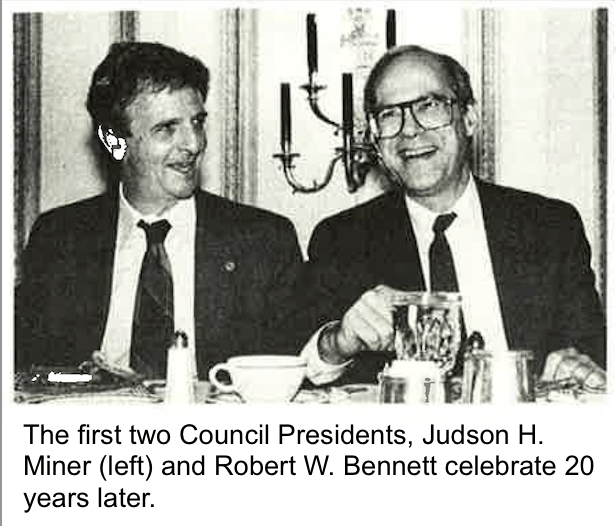
- 2000—We published “Due Process and the Death Penalty,” a report that ultimately helped bring about a moratorium on the use of the death penalty in Illinois and ultimately the end of the state’s use of capital punishment.
- 2003—We published “Electing Judges in Cook County: The Role of Money, Political Party, and the Voters” which showed definitively, for the first time, that the main determinant of judicial election outcomes is political party slating. Our findings utilized quantitative data to show that candidates running for judge in Cook County win at far higher rates when they are officially endorsed by their political party.
- 2005—Chicago Appleseed and Legal Aid Chicago released “Videoconferencing in Removal Proceedings: A Case Study of the Chicago Immigration Court,” which showed that videoconferencing is a poor substitute for in-person hearings and caused deficiencies related to access to counsel, presentation of evidence, and interpretation.
- 2007–Chicago Appleseed and our pro bono partners published one of the first comprehensive reports on felony courts in Cook County, “A Report on Chicago’s Felony Courts,” which found significant barriers to justice for self-represented litigants and people dealing with mental health and/or substance use issues. The Circuit Court implemented several of our recommendations, such as replacing videoconferenced bond hearings with in-person proceedings and creating a pretrial services program.
- 2010—Chicago Appleseed created VoteForJudges.org, which helps voters in Cook County make informed decisions about judicial elections by collecting judicial evaluation information from 13 local bar associations, including the Chicago Council of Lawyers, and media outlets, and making it easily accessible to the public. The information we provide is regularly used by Injustice Watch, Chicago Votes, NBC-Chicago, the “Girl I Guess” Voter Guide, and other media outlets to provide information to local voters every election cycle. In 2024, over 100,000 people accessed VoteForJudges.org over a million times.
- 2013—Chicago Appleseed worked with Adult Redeploy Illinois to create the ACT (Access to Community Treatment) Court in Chicago, which focused on providing community-based treatment services in felony cases to work toward a permanent reduction of the Cook County Jail population. We staffed the ACT Court with a focus on providing community-based treatment services in felony cases.
- 2016—We published “The Case for Recording Devices in Cook County Eviction Courts,” which explained the lack of access to free court reporters to transcribe the proceedings in eviction courtrooms presented serious accessibility and fairness in eviction proceedings. Finally, in 2019, after “years of lobbying by [us] and other groups to convince the Administrative Office of the Illinois Courts to allocate some $370,000 to supply Chicago’s eviction courtrooms—which process about 20,000 cases every year—with microphones for creating transcripts of court hearings” all five of the eviction courtrooms at the Daley Center have recording capacity.
- 2017—We conducted a “Constitutionality Analysis” of the bifurcated child support court in Cook County, which created a separate and unequal system for unmarried parents seeking child support. As a result of that report, we worked with the Presiding Judge’s Domestic Relations Task Force to end that system.
- 2018—We successfully advocated for and then evaluated the Chief Judge’s administrative order to authorize the Police Station Representation Unit (PSRU) in Chicago, run by First Defense Legal Aid and then the Cook County Public Defender, which provides arrested people access to lawyers at police stations. Timely access to legal representation can help mitigate potential police abuse and ensure access to 5th and 6th Amendment rights.
- 2019—We led the coalition that helped enact the Criminal and Traffic Assessments Act (CTAA), legislation that created a court costs and fees waiver for people experiencing the criminal legal system, and worked with our Transit Table Coalition partners to pass the License to Work Act, which ends driver’s licenses suspensions as penalties for nonmoving violations like parking tickets.
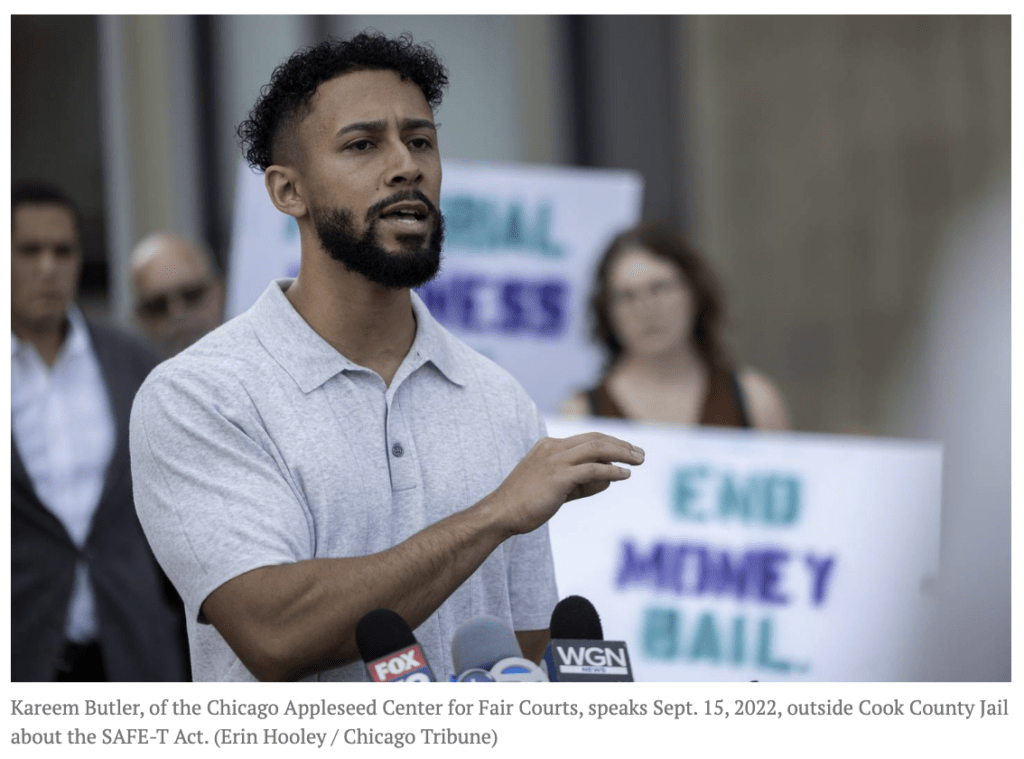
- 2020—We led the charge to protect people in jails and prisons during the first months of the COVID-19 pandemic, and successfully advocated for incarcerated people to be among the first to get the vaccine in order to protect public health.
- 2021—We successfully advocated for the Joe Coleman Medical Release Act, which allows for the release of medically incapacitated and terminally ill people from Illinois prisons to Medicaid-approved care facilities.
- 2022—We interviewed over 35 attorneys, advocates, service providers, court staff, and judges, and observed 188 court hearings to complete the first comprehensive evaluation of Cook County’s Domestic Violence Division. Our findings showed a general disconnect between judges, court staff, and litigants; issues with judicial culture and bias, lack of trauma-informed practice, and training needs; and consistent and pervasive barriers created by the Clerk of the Court’s Office.
- 2023—The Coalition to End Money Bond, of which Chicago Appleseed was a founder in 2016, successfully lobbied for the passage of the Pretrial Fairness Act, the portion of the SAFE-T (Safety, Accountability, Fairness and Equity – Today) Act which made Illinois the first state to abolish money bail.
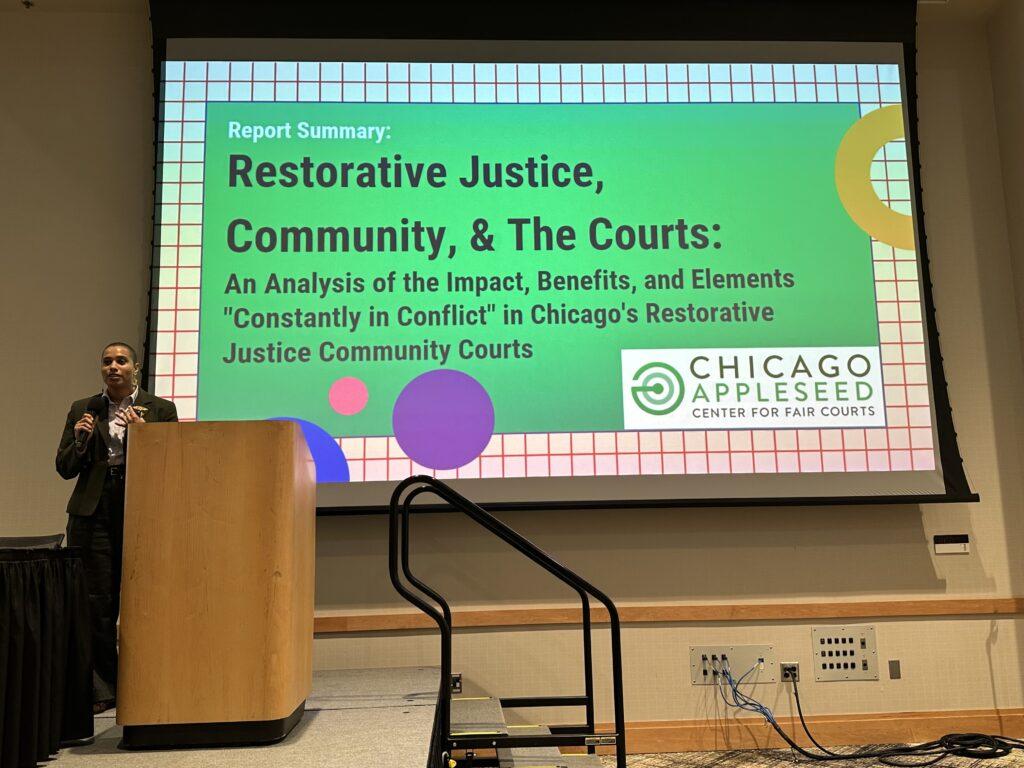
- 2024—We published “Restorative Justice, Community, and the Courts,” a report bringing to light the conflicting principles of restorative justice and the criminal legal system and advocating for a community-led restorative justice model.
- 2025—Our research led to the consolidation of Cook County’s two pretrial electronic monitoring programs, taking effect on April 1. The dual system – which had one program run by the Cook County Sheriff’s Office and one run by the Office of the Chief Judge – was not typical of major jurisdictions, didn’t follow best practices, and perpetuated civil rights issues for people in the Sheriff’s program specifically.
Over many decades, we have been at the forefront of research and reforms related to police perjury in Chicago and Cook County, judicial accountability, the “progressive prosecutor” movement, and so much more. We have and will continue to raise alarm bells about the court’s transparency problem, which is largely due to the fact that Illinois Courts aren’t subject to open records laws; the counterproductive “War on Gun Possession,” which does nothing to improve public safety and actually makes people’s circumstances worse; and the classist civil asset forfeiture system that extracts wealth from communities without any due process.
As we embark on our 55th year as the Collaboration for Justice, Chicago Appleseed Center for Fair Courts and the Chicago Council of Lawyers will continue to work together to fight for a more equitable, accessible, and accountable legal system.
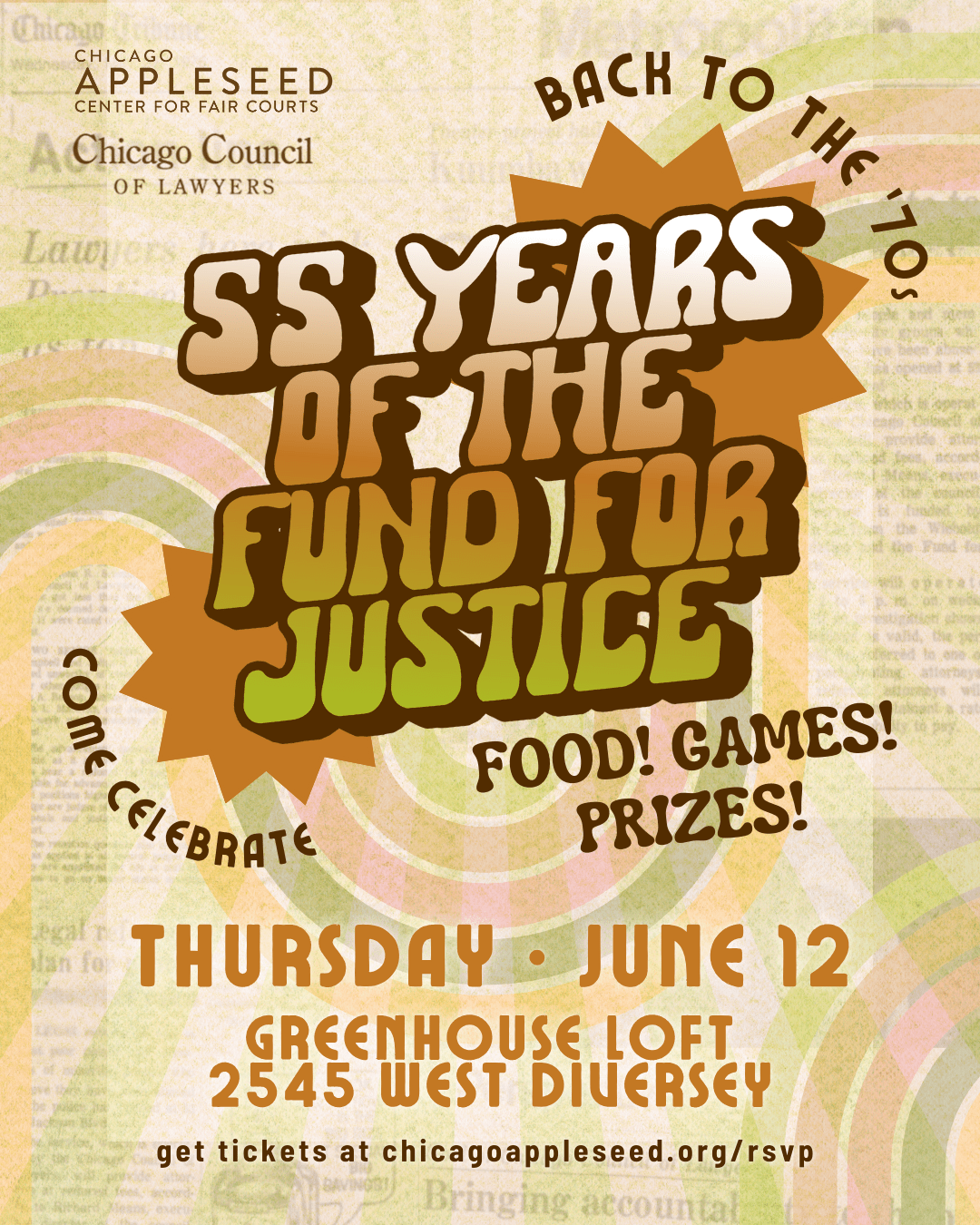
Join us on Thursday, June 12, at Greenhouse Loft to celebrate our 55th anniversary!
- Visit chicagoappleseed.org/rsvp for tickets!
- Go to chicagoappleseed.org/sponsor to become a sponsor.
- All sponsorships are tex-deductible less the cost of meals for tickets used. Learn more about sponsor our 55th anniversary party here.
Contact Ali at alongbottom@chicagoappleseed.org with any questions about our June 12th event.


